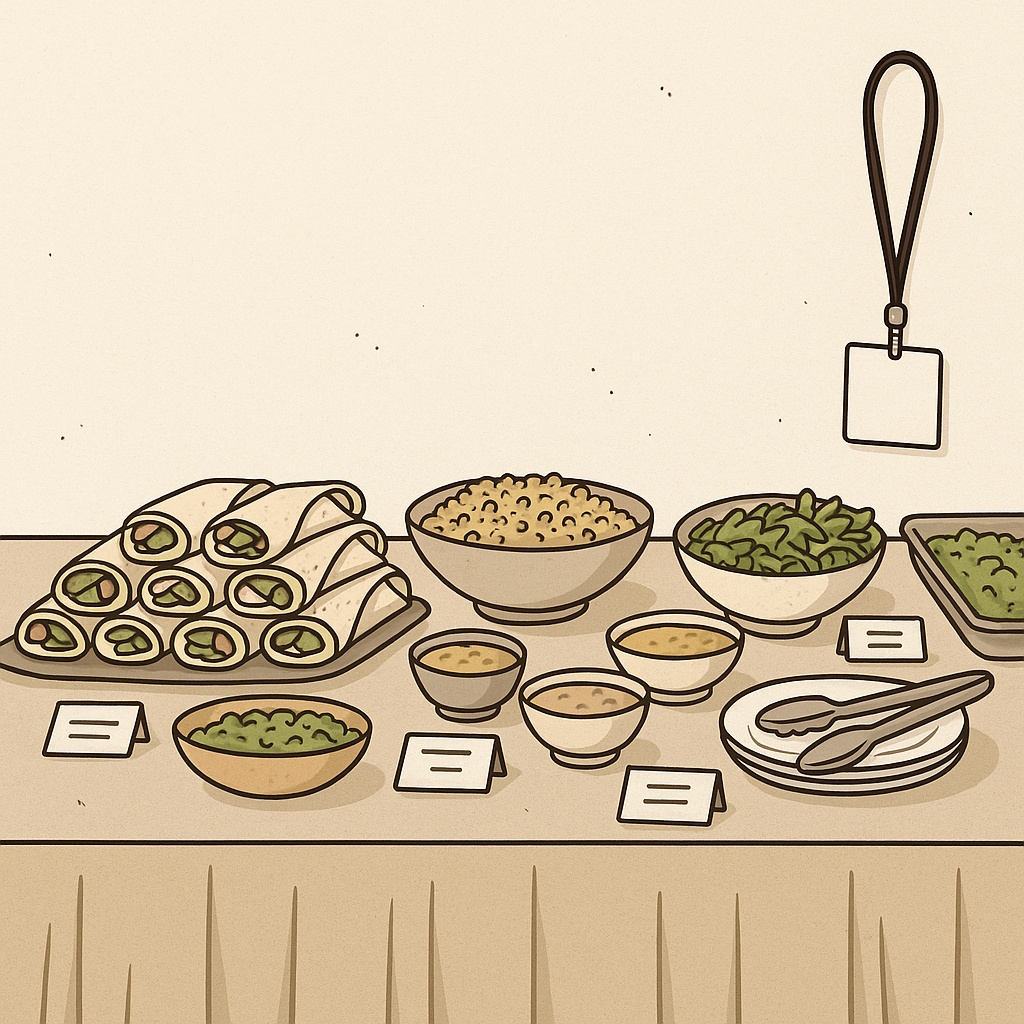I first noticed it during the lunch break of a perfectly normal academic conference. The kind with lanyards, tote bags, and a programme that uses the word “dialogic” more times than is strictly legal.
The morning sessions had left us dazed: a blur of acronyms, half-declared paradigms, and PowerPoint transitions that felt like personal attacks. As the final panel chair announced, “Lunch is now being served in the atrium,” there was a hopeful shuffle towards the rear of the building—conference attendees moving like academic wildebeest in search of calories and social awkwardness.
And there it was: the buffet table.
The buffet stretched along one wall—a long, beige affair arranged with the precision of a still life, and the warmth of an airport lounge. It looked less like catering and more like the idea of food, as interpreted by someone who had read about eating in theory but never personally attempted it.
There were wraps. Always wraps. Wrapped in more wrap. Labelled with vague, lifestyle-forward adjectives like “vitality” and “plant-based brightness”, but no discernible ingredients. The salads were composed entirely of grains that looked like bird seed in a tax audit. Somewhere in the middle sat four pots of hummus—each a slightly different shade of despair. Beige, but make it conceptual.
I did the socially mandated loop—plate in hand, pretending to assess my options like a medieval scholar studying alchemy. I picked up a beetroot-based something, held it like a reluctant handshake, and then quietly returned it. It had the texture of regret and the scent of obligation.
That’s when I noticed something strange: people were disappearing.
The Migration Begins
It started subtly. One or two attendees stepped away to “take a call.” A few more whispered something about needing air. And then, in the space of five minutes, half the delegates had mysteriously vanished.
No announcement. No group decision. Just a quiet, collective slink towards the exit.
Rumours began to circulate: “There’s a place just round the corner…” “Someone said they do chips…” “It’s not glamorous, but it’s warm, and it has chairs.”
And thus began the lunchtime migration—the kind of unspoken mass movement rarely seen outside of David Attenborough documentaries. An unorganised, deeply instinctual exodus of academics, postgrads, and suspiciously well-fed keynote speakers heading for the golden glow of chain restaurants, fast-food joints, and anywhere that didn’t serve couscous in shot glasses.
Inside, it was glorious. Name tags tucked discreetly under jackets. Conference bags shoved under greasy tables. Quiet, unspoken relief. A burger in one hand, dignity in the other.
This, finally, was nourishment.
What Happens to the Leftovers?
Back at the venue, the food remained untouched. The wraps, now drying at the edges, sat like unopened fan mail. The hummus began to crust. The salads took on the texture of packing material. The pots of mysterious grain were eventually binned by a conference assistant who had long since stopped asking questions about life, or couscous.
And yet—no one spoke of it.
No one asked what happened to the food. Or who paid for it. Or whether it would be served again tomorrow under a different label. In a space overflowing with ethics panels and sustainability pledges, no one wanted to acknowledge that an entire buffet had been ghosted.
Sociology, Stomachs, and Shame
This, I realised, was the real conference experience—not the plenaries or the networking drinks, but this unspoken bond formed over hunger and low expectations. The shared glance across a greasy chip tray. The eye contact that says “I left during the Q&A too.”
Because there’s something strangely comforting about watching your colleagues—people who just spent 45 minutes discussing intersectionality and institutional decay—order a side of nuggets with a coke and sit in silence for a blessed, ketchup-stained moment of peace.
Back at the venue, someone was giving a paper on radical hospitality. No one clapped.
Final Thoughts in a Food Court
Next time you attend a conference and find yourself standing in front of a table full of food no one asked for, remember this: you are not alone. You are surrounded by others making the same calculation.
They too will quietly slip away, trailing lanyards and shame, to the safety of chips and seating.
Because sometimes, academic nourishment looks less like beetroot foam and more like a £4.99 meal deal.
And that’s perfectly valid.
AJ Wright is a quiet yet incisive voice navigating the surreal world of sociology, higher education, and modern life through the unique lens of a neurodivergent mind. A tech-savvy PhD student hailing from South Yorkshire but now stationed in the flatlands of Lincolnshire, AJ writes with an irreverence that strips back the layers of academia, social norms, and the absurdities of daily life to reveal the humour lurking beneath.
As an autistic thinker, AJ’s perspective offers readers a rare blend of precision, curiosity, and wit. From dissecting the unspoken rituals of academia—like the silent war over the office thermostat—to exploring the sociology of “neurotypical small talk” and the bizarre hierarchies of campus coffee queues, AJ turns the ordinary into something both profound and hilarious.
AJ’s unassuming nature belies the sharpness of their commentary, which dives deep into the intersections of neurodiversity, tech culture, and the often-overlooked quirks of human behaviour. Whether questioning why university bureaucracy feels designed by Kafka or crafting surreal parodies of academic peer reviews, AJ writes with a balance of quiet intensity and playful absurdity that keeps readers coming back for more.
For those seeking a blog that is equal parts insightful, irreverent, and refreshingly authentic, AJ Wright provides a unique perspective that celebrates neurodiversity while poking fun at the peculiarities of the world we live in. Also a contributor at Thinking Sociologically.
Discover more from untypicable
Subscribe to get the latest posts sent to your email.
